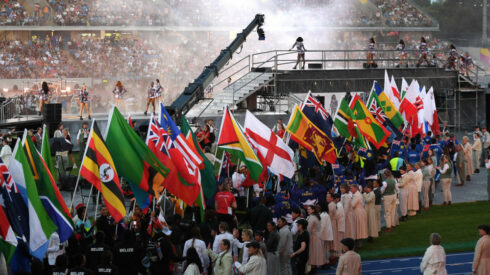Written by Dr. Binoy Kampmark
Hosting sporting events has always been a government’s formula to distract their seducible subjects. It’s the secular version of smells and bells, the warbling of the church choir turned into flesh and performance. If such occasions are of sufficient scale, they might even be political promotions, body beautiful types paraded and performing before clapping and glorifying spectators. Sponsors also have their share of exposure. Horrendous expenses can thereby be justified, raids on the treasury written off in the name of improving society’s spiritual being.
For all their heralded merits, mega sporting events usually have two clear outcomes: the budget blowout followed by the White Elephant syndrome. In that effort, other spending programs will be slashed or sacrificed altogether. But the propagandists will always shoot back: the sporting show is not merely the athlete on display but a form of renewal, a communal release. Why such renewal cannot happen without the building of sporting facilities with public funds is never made clear, though much is made of consumer spending, be it on food, drink and accommodation.
Such issues, and more beside, have been ignited with the cancellation of the 2026 Commonwealth Games by the Victorian state government. Premier Daniel Andrews, in announcing the matter on July 18, stated that the cost of hosting the Commonwealth Games in Victoria would exceed A$6 billion, “more than twice the estimated economic benefit the Games would bring our state.”
Andrews explains the “main reason” for originally agreeing to host the Games: “to deliver lasting benefits in housing, tourism and sporting infrastructure for regional Victoria.” It was flawed reasoning from the start, linking the hosting of a sporting event with a social, economic program. But even more critically, the decision to host an event no one else wanted was made even as the state’s debt was ballooning. Victoria faces deficits fed by the borrowing of A$31.5 billion worth in emergency funds to combat the COVID pandemic. The cynics had to venture the point that this whole affair was an indulgent political gambit, at least in part: to pitch for the Games would earn rewards at the November 2022 poll.
Given such money problems, the burgeoning costs came to be seen as something of a nightmare. This was hardly helped by the government’s own decision to essentially avoid the pre-existing facilities already available in Melbourne. The decision to spread the games across four regional hubs in Victoria was always going to swell the sum in any logistical sense.
In place of not hosting the games, the Andrews government is offering “a comprehensive A$2 billion package to ensure regional Victoria still receives all the benefits that would have been facilitated by the Games – and more.”
While Andrews insists that funding that would otherwise be spent on the Games would be channelled into, for instance, the building of 1,300 homes in country Victoria, such claims are undercut by the sheer scale of spending on sporting infrastructure in the regional areas, projected for 2026. These include funding to build or upgrade a number of facilities from football stadia to netball courts and pools.
Ballarat is promised a 5,000 permanent seater upgrade and a facility “including competition-grade oval and sports pavilion with carparking, amenities and changerooms.” Bendigo can expect a redeveloped Bowls Club, while Bendigo Stadium will receive four additional sports courts.
The result is an Andrews magic formula that, once the pudding is baked, is unlikely to be as nourishing, let alone wholesome, as thought. In it, all is expected to come together in unrealistic fashion: the sporting infrastructure to bribe the community; the tourism that will mysteriously make its way to regional Victoria; and a relief on the crushingly inaccessible housing market.
Sporting events are cancelled in Australia on pain of reputational battering. Reputations will be tarred and feathered, to forever wander through halls of infamy. That such a move might be wise and necessary is neither here nor there. Priorities, much like beauty, lie in the eye of the beholding punter. And so it is that the Australian Financial Review regards the cancellation as “a disaster for Victoria’s reputation as the host of major events and the supposed sporting capital of the world.” (Really? According to whom?)
The Commonwealth Games Australia (CGA) chief executive, Craig Philips, followed the script of reputational beating.
“I would be very careful if I was an international sporting body coming and doing business in this state in the future.”
Ditto John Coates of the International Olympic Committee, a famed crawler to the sporting industrial complex.
“It must reflect on Australia when we’ve committed to host an event and thinking that we had the support of the state government and they’ve pulled the plug.”
Much bemoaning also focuses on the welfare of the athletes. Those poor, fit darlings, so eager to represent their country, deprived from competing in an antiquated event with all too modern costs. One athlete, Paralympian and Commonwealth Games gold medal winner, Rowan Crothers, even had the imaginative gall to say that the cancellation would “suck for the state of inclusion”. How, pray?
For all the clumsiness and sheer carelessness of the Andrews government, the merits of not hosting such a large sporting venture are hard to dismiss. Billions of dollars being injected into what Andrews called “a 12-day sporting event” is always a hard proposition to sustain. The benefits of cancellation in his case, however, have been blunted. Victoria need never have applied in the first place and now faces what may amount to a hefty damages bill.
The result of the cancellation has also sent deserved jitters through the resource sucking megaevent sporting fraternity. Australia is, after all, playing host to the FIFA Women’s World Cup while Brisbane is set to host the 2032 Summer Olympics. In all the fanfare and bluster, former Australian swimmer and CEO of the Australian Sports Commission, Kieren Perkins, had a more grounded observation to make: “Where large portions of the population don’t see that benefit [of hosting such events], it probably does ask questions of us of how exactly we are actually deploying the resources that we receive”. How, indeed.
Dr. Binoy Kampmark was a Commonwealth Scholar at Selwyn College, Cambridge. He currently lectures at RMIT University. Email: [email protected]




